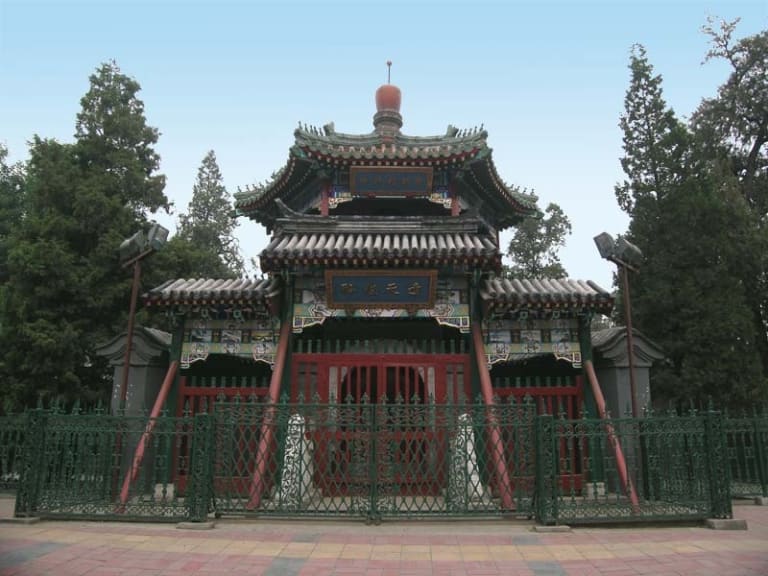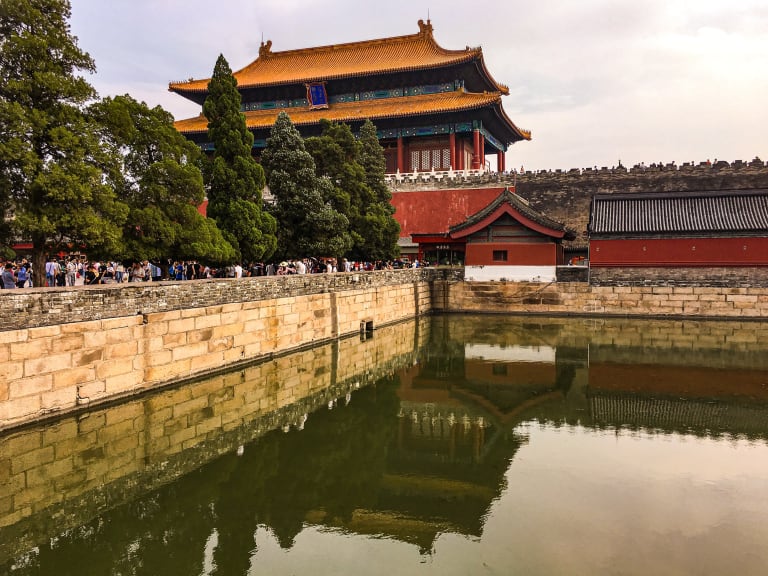More about: 10 Best Temples in Beijing
In the 15th century, active construction of temples and palaces began in Beijing. Many of these ancient structures have survived to the present day to become popular tourist destinations, which you should include on your list of things to see and do in Beijing.
There are many temples in the city worth exploring and each of them has its own history and architecture that make them fascinating for visitors, among them is the Temple of Heaven, which embodies the unity of Earth and Heaven and is one of the most visited places by tourists.
1. Zhengjue Temple

This Buddhist temple was built during the Qing Dynasty in the former summer palace and is the only temple to survive the fire of 1860. After years of repair and reconstruction, it is finally possible to visit it on your own or sign up for one of the best tours in Beijing.
Inside the palace you will find ancient elements that are over 300 years old and an interesting thing to know about this temple is that archaeologists are still working on reconstructing and understanding the architecture of the Qing Dynasty to decipher the original appearance of the temple.
Inside there are several exhibits that you can enjoy that showcase the cultural relics that have survived to this day.
Details of interest
- Price: around 6 euros.
- Opening hours: Weekends between 00:00 and 23:59.
- Location: 28 Qing Hua Xi Lu Street, Hai Dian Qu in Beijing.
2. Niujie Mosque

The Niujie Mosque in Beijing is considered the oldest mosque in the city. It dates back to 996 and I recommend you include it among the places to visit if you sign up for a bike tour of Beijing.
Over the years, there have been several major reconstructions of the building, but despite the changes it was possible to maintain the original appearance of the mosque to achieve the finish you see today.
Inside the mosque area you will find a main prayer hall, where around 800 Muslims attend daily. You will also discover a special place for women. You will be struck by the exterior façade of the building, which is made of wood and decorated with bright red, blue and grey colours.
Interesting details
- Price: around 2 euros per person.
- Opening hours: daily between 9:00 and 16:30.
- Location: 18 Niu Jie, Xi Cheng Qu in Beijing.
3. Yellow Temple

Another must-see temple is the Huangsi Temple, also known as the Yellow Temple. It is a complex of Buddhist temples in which you will find two identical halls on the outside, but different on the inside.
It is a must-see along with a visit to the Forbidden City when booking the Great Wall of China, Forbidden City and Tiananmen tour, for example.
The Eastern Yellow Temple, known as the Temple of Universal Purity, was built around 1651 for Naomuhan Buddha. And the Western Yellow Temple was erected a year later and is called the Dalai Lama Temple, as it served as the residence of the Fifth Dalai Lama.
Details of interest
- Price: approximately 4 euros.
- Opening hours: daily between 09:00 and 16:00.
- Location: on the main street of Huangsi, in the Chaoyang district.
4. Yonghe Tibetan Buddhist Temple

This is one of the largest Buddhist temples in China and is now a monastery and temple of the Tibetan Buddhist school. It was erected in 1694, but it was not until 1744 that it became a monastery where the Qianlong Emperor installed 500 Lamaist monks.
This temple will catch your attention because it is painted in gold and red colours. It also covers an area of 66,000 square metres. Behind the central entrance, you will see a long avenue that ends in a beautiful high arch. You will also see towers that hold the bell and drum, which are used for different rituals and celebrations.
Inside the complex you will see the Hall of Heavenly Kings, with sculptures of four wrathful guards and the statue of Maitreya Buddha, believed to be carved from a single sandalwood trunk. Visiting this temple is as much a must-do as booking a trip to the Great Wall of China to see it.
Details of interest
- Price: around 4 euros per person.
- Opening hours: between 8:00 and 17:00.
- Location: 12 Yonghegong Street, Dongcheng Qu, Beijing.
5. Temple of Earth

The Earth Temple was damaged during the "Cultural Revolution", but was later restored and restructured to its original version, so you will be delighted to see what it looks like today.
Inside the complex you will see five buildings distributed into: the imperial house, a palace, a storehouse, a sacrificial pavilion and an altar. You can also see around 170 ancient trees, including gingko, elm and juniper.
You can also see the Temple of Heaven, the Temple of the Earth, the Temple of the Moon and the Temple of the Sun. With the amount of valuable and historical objects inside, it could easily be considered one of the best museums in Beijing.
Interesting details
- Price: approximately 5 euros per person.
- Opening hours: between 6:00 and 21:00.
- Location: Andingmen Outer Andingmen Street of AnDingMen, Dongcheng Qu.
6. Temple of Heaven

The Temple of Heaven has become one of the main symbols of the city because of its shape and structure. Although in the past it was used as a place of shelter for prayers of Thunder, Clouds, Heaven and Earth, nowadays it is a sacred place where you will have the opportunity to learn about the history and culture of China.
Something curious to know about this place is that its name originally translates as "Altar of Heaven". This place is located very close to the Imperial Palace, so you can visit both places and even sign up for a tour of the Hutongs on the same day.
In fact, this place is one of the visits you should include in your list of things to see and do in Beijing in winter, because in this season a tradition that has more than five centuries of history takes place. In it, the Emperor, after three days of very strict fasting, visits the temple to offer generous gifts to heaven.
Interesting details
- Price: around 4 euros per person.
- Opening hours: between 6:00 and 20:00.
- Location: 1 Tiantan E Rd, Dongcheng Qu.
7. Temple of the Heavenly Clouds

The Temple of the Heavenly Clouds is located very close to the north gate of Xianggshan in Beijing Park. Its construction dates back to the 14th century and part of what you can see inside are its ancient sculptures.
It also has a unique panoramic view of the surrounding area and the Luohan Hall. Not all of the original ancient buildings have been preserved to this day, however, there is still a lot to see in the complex.
Also, inside the monastery you will have the opportunity to visit the Hall of the Heavenly Kings, where you can see the bronze figure of Milefo. On the other hand, and in the western area of the temple, you will be able to see the "Hall of the Hundred Immortals", which is a large and luminous hall that you will surely enjoy visiting.
Interesting details
- Price: around five euros.
- Opening hours: from 06:00 to 18:00.
- Location: Xiangshan Lu, Haidian District. As a reference, you should know that it is located next to the north entrance of the Fragrant Hills Park.
8. Wanshou Temple

If you want to visit the Wanshou Temple, you should know that it is a quiet and peaceful place. In the old days, it was the main place for ceremonies to celebrate the emperor's birthday.
Nowadays it is home to the Beijing Art Museum, so inside you can find different exhibitions: the exhibition of furniture, about the history of the monastery and one of the art of Buddhism. You can also see an exhibition of porcelain and an exhibition of Beijing's cultural values.
In addition, inside the museum you can see around 50,000 exhibits on all kinds of ancient Chinese art, from the primitive era to the time of the Qing and Ming emperors. Since August 1979 it has been christened as a key asset, basically because it demonstrates the essence of Chinese culture, while preserving within it, rare examples of the achievements of the civilisation in general.
Details of interest
- Price: around 6 euros per person.
- Opening hours: Tuesday to Sunday between 9:00 and 16:30. Mondays open from 9:00 to 16:30.
- Location: on the Zizhu Bridge in Haidian.
9. Confucius Temple

The Confucius Temple is quite old and dates back to 1306, but throughout history it has been repaired and rebuilt several times. Despite this, most of the buildings in the temple complex have retained their original form.
It isthe largest Confucian temple and the second largest of all the temples in Beijing. The temple is divided into two parts, the first part being a courtyard of approximately 30,000 square metres.
The rest of the temple is owned by the State Academy, which is also known as the Imperial Academy and the Academy of the Wise. An interesting thing you might like to know about this academy is that it was originally just a school, but later became a study centre and then the Guojiang Academy.
Interesting details
- Price: about 5 euros for each adult and about 3 euros for each child.
- Opening hours: between 8.30am and 5pm daily.
- Location: 13 Guozijian Street.
10. Guangji Temple

One of the most recommended places to visit in Beijing is Guangji, because it is one of the oldest temple complexes in the city. Basically, it is a place where you will find a lot of history and tradition.
Although the construction of the temple dates back to the 12th century, it has been destroyed and rebuilt several times, although the most valuable exhibits of ancient China have been preserved. You will be impressed by the white marble altar, a bronze Maitreya statue, Buddha statues and other treasures on display.
The complex is quite a large site and inside each of the buildings are separated by massive gates. Plastered on the walls are numerous images of Buddhist deities. You can also find a library with more than 100 thousand volumes of books and an incredible collection from the Minsk period inside the complex.
Interesting details
- Price: about five euros per person.
- Opening hours: from 8:00 and 17:00.
- Location: at 25 Fuchengmen Inner Street, Xicheng Qu.









